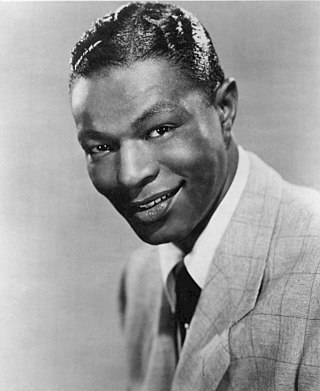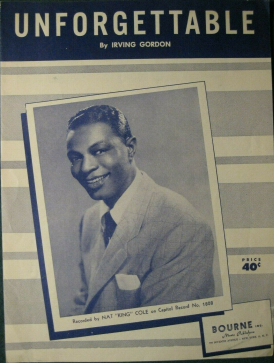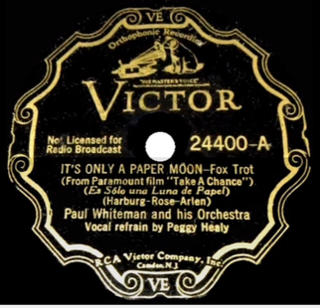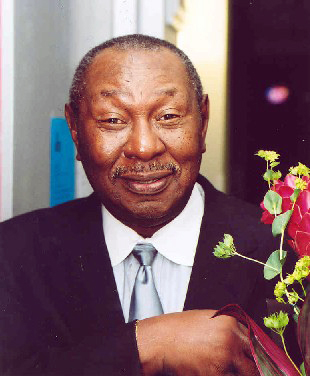Related Research Articles

Nathaniel Adams Coles, known professionally by his stage name Nat King Cole, was an American singer, jazz pianist, and actor. Cole's career as a jazz and pop vocalist started in the late 1930s and spanned almost three decades where he found success and recorded over 100 songs that became hits on the pop charts.

The Blue Gardenia is a 1953 American film noir starring Anne Baxter, Richard Conte, and Ann Sothern. Directed by Fritz Lang from a screenplay by Charles Hoffman, it is based on the novella The Gardenia by Vera Caspary.
"Smile" is a song based on the theme song used in the soundtrack for Charlie Chaplin's 1936 film Modern Times.
"Time After Time" is a romantic jazz standard with lyrics written by Sammy Cahn and music by Jule Styne in 1946.
"Do Nothing till You Hear from Me" is a song with music by Duke Ellington and lyrics by Bob Russell. It originated as a 1940 instrumental that was designed to highlight the playing of Ellington's lead trumpeter, Cootie Williams. Russell's words were added later. In 1944, Ellington's own recording of the song was a number one hit R&B chart for eight non-consecutive weeks and number six on the pop chart.

"Smoke Gets in Your Eyes" is a show tune written by American composer Jerome Kern and lyricist Otto Harbach for the 1933 musical comedy Roberta. The song was sung in the Broadway show by Tamara Drasin. Its first recorded performance was by Gertrude Niesen, who recorded the song with orchestral direction from Ray Sinatra, Frank Sinatra's second cousin, on October 13, 1933. Niesen's recording of the song was released by Victor, with the B-side, "Jealousy", featuring Isham Jones and his Orchestra. The line — When your heart's on fire, smoke gets in your eyes — apparently comes from a Russian proverb.
"It's De-Lovely" is one of Cole Porter's hit songs, originally appearing in his 1936 musical, Red Hot and Blue. It was introduced by Ethel Merman and Bob Hope. The song was later used in the musical Anything Goes, first appearing in the 1956 film version ; in the 1962 revival where it was sung by Hal Linden and Barbara Lang, and in the 2004 biographical film De-Lovely, where it was performed by Robbie Williams.

"Unforgettable" is a popular song written by Irving Gordon. The song's original working title was "Uncomparable"; however, the music publishing company asked Gordon to change it to "Unforgettable". The song was published in 1951.

"It's Only a Paper Moon" is a popular song published in 1933 with music by Harold Arlen and lyrics by Yip Harburg and Billy Rose.
"This Can't Be Love" is a show tune and a popular song from the 1938 Rodgers and Hart musical The Boys from Syracuse when it was sung by Eddie Albert and Marcy Westcott. The lyrics poke fun at the common depiction of love in popular songs as a host of malignant symptoms, saying, "This can't be love because I feel so well."
"I'm Beginning to See the Light" is a popular song and jazz standard, with music written by Duke Ellington, Johnny Hodges, and Harry James and lyrics by Don George and published in 1944.
Belford Cabell "Sinky" Hendricks was an American composer, pianist, arranger, conductor and record producer. He used a variety of names, including Belford Hendricks, Belford Cabell Hendricks, Belford Clifford Hendricks, Sinky Hendricks, and Bill Henry.

Lionel Frederick Cole was an American jazz singer and pianist whose recording career spanned almost 70 years. He was the brother of musicians Nat King Cole, Eddie Cole, and Ike Cole, father of Lionel Cole, and uncle of Natalie Cole and Carole Cole.
"Let's Face the Music and Dance" is a song published in 1936 by Irving Berlin for the film Follow the Fleet, where it was introduced by Fred Astaire and featured in a celebrated dance duet with Astaire and Ginger Rogers. The jazz song has also been covered by various artists years following its release, including Nat King Cole, Ella Fitzgerald, Frank Sinatra, Mel Torme, Todd Gordon and others.
Jack Segal was a pianist and composer of popular American songs, known for writing the lyrics to Scarlet Ribbons. His composition May I Come In? was the title track for a Blossom Dearie album. Other songs he authored or co-authored are When Sunny Gets Blue, That's the Kind of Girl I Dream Of, I Keep Going Back to Joe's, A Boy from Texas, a Girl from Tennessee, After Me and When Joanna Loved Me. It has been estimated that his songs have helped sell 65 million records.

My Fair Lady, recorded by "Shelly Manne & His Friends" and released in 1956 by Contemporary Records, is the first album ever made consisting entirely of jazz versions of tunes from a single Broadway musical. It was an instant hit and became one of the best-selling jazz albums of its day.
Blue Gardenia may refer to:

The Nat King Cole Story is a 1961 album by Nat King Cole. The album was a retrospective of Cole's recording career, designed to present many of his earlier hits in new recordings featuring stereo sound. Cole is accompanied on the re-recordings by many of the notable arrangers and bands that had appeared with him on the original records.
"The Gentle Rain" is a 1965 bossa nova composition by Luiz Bonfá, with lyrics by Matt Dubey. Originally written in A minor key and 4/4 time, this song was first released as part of the motion picture soundtrack of the 1966 film The Gentle Rain of the North-American director Burt Balaban. The music of the film was a collaboration of Luiz Bonfá as a composer and Eumir Deodato as orchestra arranger and director.

Gentle Rain is the final album by vocalist Irene Kral performing with pianist Alan Broadbent, which was recorded in 1977 and originally released on the Choice label and re-released by Candid on CD in 2001.
References
- ↑ "Blue Gardenia". Secondhandsongs.com. Archived from the original on August 19, 2013. Retrieved January 21, 2021.
- ↑ Gabbard, Krin (2014). Kiss the Blood Off My Hands: classic film noir. Chicago: University of Illinois Press. pp. 72–76. ISBN 978-0-252-09651-8.
- ↑ "Record a Day: Record #0559: Can't I / Blue Gardenia – NAT "KING" COLE". T-recs-recordaday.blogspot.com. 17 August 2014. Retrieved 30 April 2021.
- ↑ Vail, Ken (2002). Duke's Diary: the life of Duke Ellington 1950-1974 Part 2. Lanham MD: Scarecrow Press. p. 79. ISBN 978-0810841192.
- ↑ Ruppli, Michel; Novitsky, Ed (1993). The Mercury Labels: the 1956-1964 era . Westport CT: Greenwood Press. p. 393. ISBN 978-0313290312.
- ↑ Hughes, Howard (2009). Aim for the Heart: the films of Clint Eastwood . London: I.B. Tauris & Co. p. 112. ISBN 9781845119027.
- 1 2 3 4 "Cover versions of Blue Gardenia written by Lester Lee, Bob Russell". Secondhandsongs.com. Retrieved 30 April 2021.
- ↑ "Bobby Scott,Star,Columbia CS 9779,Two Eye 1st Stereo Pressing,Vinyl Jazz LP". eBay.com. Retrieved 30 April 2021.
- ↑ "Bruno Martino - Blue Gardenia - hitparade.ch". Hitparade.ch. Retrieved 30 April 2021.
- ↑ "The Gentle Rain - Irene Kral | Songs, Reviews, Credits | AllMusic". AllMusic . Retrieved 30 April 2021.
- ↑ "Travelin' Light - Della Griffin | Songs, Reviews, Credits | AllMusic". AllMusic . Retrieved 30 April 2021.
- ↑ "Charles Davis: Blue Gardenia album review". Allaboutjazz.com. Retrieved 30 April 2021.